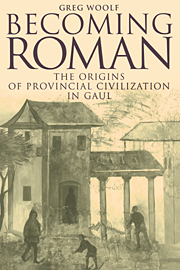Book contents
- Frontmatter
- Contents
- List of illustrations
- Preface
- Abbreviations
- Map 1 Modern regions and river names
- Map 2 Provincial boundaries c. ad 100
- Map 3 Major peoples of Roman Gaul
- 1 On Romanization
- 2 Roman power and the Gauls
- 3 The civilizing ethos
- 4 Mapping cultural change
- 5 Urbanizing the Gauls
- 6 The culture of the countryside
- 7 Consuming Rome
- 8 Keeping faith?
- 9 Being Roman in Gaul
- List of works cited
- Index
5 - Urbanizing the Gauls
Published online by Cambridge University Press: 09 December 2009
- Frontmatter
- Contents
- List of illustrations
- Preface
- Abbreviations
- Map 1 Modern regions and river names
- Map 2 Provincial boundaries c. ad 100
- Map 3 Major peoples of Roman Gaul
- 1 On Romanization
- 2 Roman power and the Gauls
- 3 The civilizing ethos
- 4 Mapping cultural change
- 5 Urbanizing the Gauls
- 6 The culture of the countryside
- 7 Consuming Rome
- 8 Keeping faith?
- 9 Being Roman in Gaul
- List of works cited
- Index
Summary
A world of villages
Barbarism might be defined in negative terms as an absence of civilized qualities. Among the many respects in which Gauls might be found lacking by the discriminating gaze of their new rulers was that they did not live in cities. The city was conceived of as a community of citizens united by laws and the worship of the gods, the natural environment of men, in other words that in which they could best realize their moral potential. Beyond the civilized world of cities, the classical writers described men living in villages, scattered through the countryside, or else as nomads, wanderers with no fixed abode eating raw flesh like animals, drinking only milk. The spread of civilization could thus be traced in the foundation of cities. The public monuments of a city were the physical expression of its politeia and the high culture of the elite might be termed urbanitas, a term that came to embrace refinement, taste and literary style. Even in their suburban and rural villae, the elites of the early empire created little islands of urban culture, residences marked out as urban by architecture and domesticated gardens, by the comforts with which they were equipped, baths, mosaics and wall paintings depicting idealized rural vistas, and slave staffs. Those excluded by the ideal of urbanitas were the uneducated of the town as well as of the country, and like humanitas, the ideal operated as a class marker.
- Type
- Chapter
- Information
- Becoming RomanThe Origins of Provincial Civilization in Gaul, pp. 106 - 141Publisher: Cambridge University PressPrint publication year: 1998

